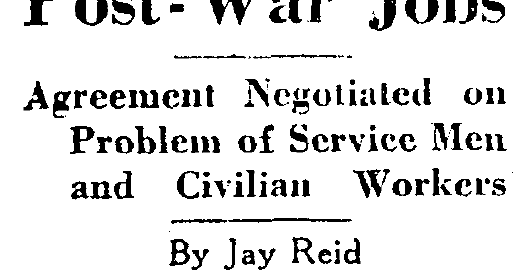V.F.W., Unions Reach Plan on Post-War Jobs
Agreement Negotiated on Problem of Service Men and Civilian Workers
New York Herald Tribune
July 19, 1944
By Jay Reid
A common refrain these days, whenever the federal government intervenes in the economy, is that politicians are picking winners and losers.
In the summer of 1944, Jay covered the process of the government picking losers and bigger losers.
The binary simply did not exist at that point in history.
One the one hand, there were millions of men who would be returning from the war, only to be greeted by an economy transitioning from wartime to peace time, a process that was likely to send it into recession.
On the other hand, there were all the people back home, many of them women, who stepped up to fill those vacated jobs as the military drafted ever more men.
Who should get the jobs was not an easy question to answer.
Some group (or groups) would come out on the losing end of a decision that would probably feel unfair.
Perhaps most interesting about the whole situation is how early the government began planning for the economic transition.
In order to have a decision ready in the summer of 1944, planning was begun before the D-Day invasion of France.
In recent years, there has been a lot of debate in the U.S. about gender dynamics in the workplace.
Why aren’t there more female executives? What, if anything, should be done about it?
In reading Jay’s article, it is difficult not to draw a straight line from the decision to grant returning veterans the right to reclaim their old jobs, as well as passage of the GI Bill that sent many men to college who otherwise would not have had the means to go, to today’s imbalances.
Alternately, the country might have already achieved gender parity in the workplace had returning veterans not been given these two distinct advantages.
In the end, a group of men, traumatized by war, would come home and lead the development of the greatest economic powerhouse the world had ever seen.
It is difficult to imagine such an achievement being possible had these men been left on the sideline, as many of their sons would be a generation later.
That was little consolation to those whose toe-hold in the economy proved fleeting, but while it was unfortunate that there would be a losing end of this all-important decision, by the time it was implemented everyone had already paid a high price for four years of war.




